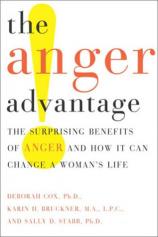Reading Group Guide
Discussion Questions
The Anger Advantage: The Surprising Benefits of Anger and How it Can Change a Woman's Life

1. In the first chapter, The Anger Advantage addresses the many myths that shape how women think about anger: anger is avoidable, anger makes you seem stupid, anger ruins relationships, anger is unattractive. How do these myths play out in real life, in your life, and in other women's daily lives?
2. The Anger Advantage identifies the role of anger in romantic relationships, particularly with regard to how women feel about sex. Could you identify with the examples in this chapter? What are some ways to manage anger in a romantic relationship? What did you think of using anger as a way to identify trouble in relationships?
3. Anger skills at work can not only help women create a comfortable workplace for themselves, but also help them succeed. How could skills such as the "think tank" and learning to listen help you with a challenge at work? Do you think these skills would work well with your coworkers? What new skills would you choose in addressing anger with a manager?
4. Women's friendships seem to be a hotspot for anger diversions. In friendship we don't find as many socially-dictated rules as we do in family or work-related interactions. Did you recognize yourself or your friends in any of the examples in this section? Can you think of a time when triangulation, segmentation, or internalization played a role in one of your own friendships? How would you apply positive anger skills to your friendships? What results would you hope to see?
5. The Anger Advantage is about women's anger, and how women react to anger. What about male anger? Do you see similarities and differences between how women and men express anger? Which styles of expression do you think are most effective?
6. The section on parenting demonstrates how anger diversions are often passed along from mother to child. Healthy approaches to anger can also be passed along through family interactions. What parenting examples are you setting? Can you identify the spoken or unspoken rules your family has concerning anger? Are there any you would like to change? Do you think taking The Anger Advantage's approach to anger will help your daughters better understand anger?
7. Having worked through the quizzes, examples and steps of The Anger Advantage, do the myths discussed in the introduction make you feel, well, angry? How can women work on changing these myths?
8. Now that you have worked on anger consciousness, do you look back on past situations and recognize anger that was diverted into frustration, sadness or even depression?
9. How do women in the public eye fare when they express anger? Do you think they are treated fairly?
The Anger Advantage: The Surprising Benefits of Anger and How it Can Change a Woman's Life
- Publication Date: April 22, 2003
- Hardcover: 288 pages
- Publisher: Broadway
- ISBN-10: 0767911601
- ISBN-13: 9780767911603






